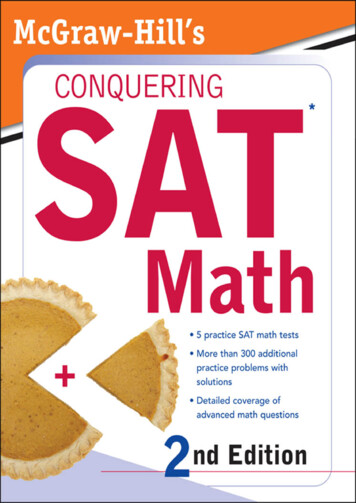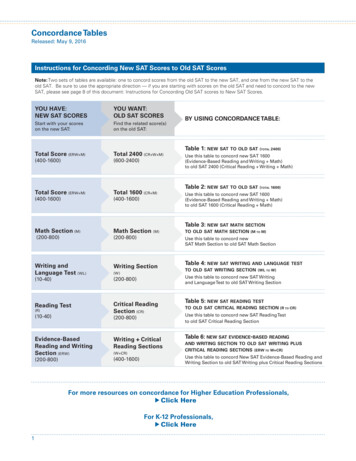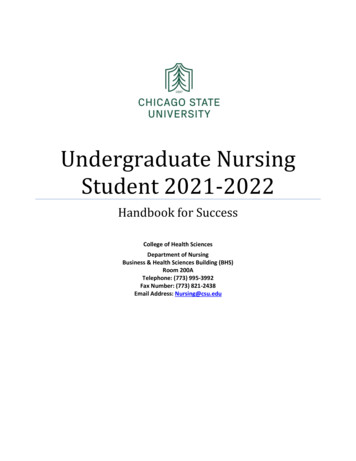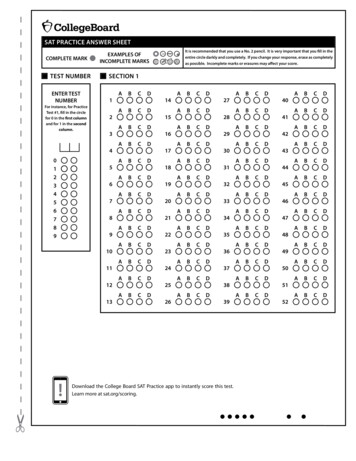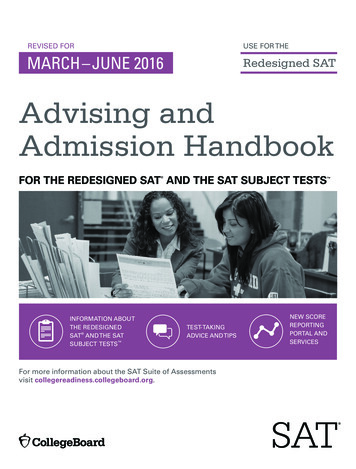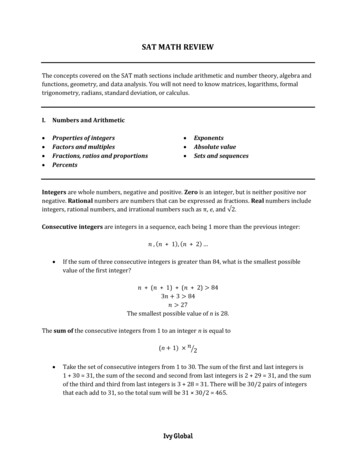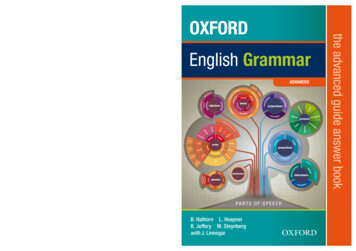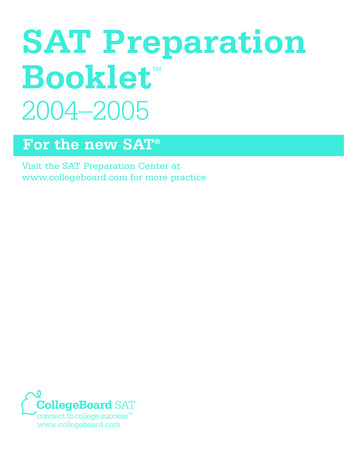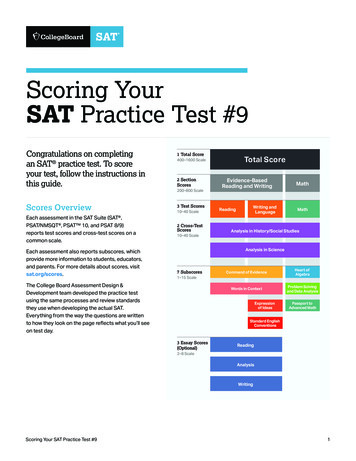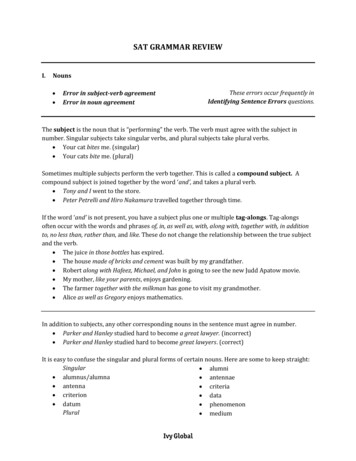
Transcription
SAT GRAMMAR REVIEWI.Nouns These errors occur frequently inIdentifying Sentence Errors questions.Error in subject-verb agreementError in noun agreementThe subject is the noun that is “performing” the verb. The verb must agree with the subject innumber. Singular subjects take singular verbs, and plural subjects take plural verbs. Your cat bites me. (singular) Your cats bite me. (plural)Sometimes multiple subjects perform the verb together. This is called a compound subject. Acompound subject is joined together by the word ‘and’, and takes a plural verb. Tony and I went to the store. Peter Petrelli and Hiro Nakamura travelled together through time.If the word ‘and’ is not present, you have a subject plus one or multiple tag-alongs. Tag-alongsoften occur with the words and phrases of, in, as well as, with, along with, together with, in additionto, no less than, rather than, and like. These do not change the relationship between the true subjectand the verb. The juice in those bottles has expired. The house made of bricks and cement was built by my grandfather. Robert along with Hafeez, Michael, and John is going to see the new Judd Apatow movie. My mother, like your parents, enjoys gardening. The farmer together with the milkman has gone to visit my grandmother. Alice as well as Gregory enjoys mathematics.In addition to subjects, any other corresponding nouns in the sentence must agree in number. Parker and Hanley studied hard to become a great lawyer. (incorrect) Parker and Hanley studied hard to become great lawyers. (correct)It is easy to confuse the singular and plural forms of certain nouns. Here are some to keep straight:Singular alumni alumnus/alumna antennae antenna criteria criterion data datum phenomenonPlural mediumIvy Global
II. Pronouns Error in pronoun caseError in pronoun-antecedent agreementError in pronoun-verb agreementError in pronoun consistencyThese errors occur frequently inIdentifying Sentence Errors questions.Pronouns are words that take the place of and refer back to previously mentioned antecedentnouns. Like their noun counterparts, pronouns can take a subject or object role in the sentence.Each personal pronoun has a nominative (subject) and objective (object) case. She and I went to the store. (nominative)NominativeObjective Jerry took him and me to the dance. (objective)ImeweusIf you’re unsure, test with a single pronoun.youyouhehimWho is a subject pronoun, and whom is an object pronoun.sheher Who went to the store? (nominative)itit Whom did Jerry take to the dance? (objective)theythemwhowhomPronouns that come after a preposition (by, of, for, after, with,between, except, without, etc.) are considered objects of the preposition and take the objectivecase. Everyone did well on the exam except him and her. Sarah left without John and me. Please keep this between you and me. By whom was this wonderful short story written?Constructions with than: whenever a pronoun follows than, it should be in the subjective case. Afollowing verb is always understood, if not always articulated. I am taller than he (is). Sarah is better at math than I (am).Pronouns must agree in number with their antecedents. If the antecedent is singular, the pronounmust be singular. If the antecedent is plural, the pronoun must be plural. A student will catch their mistakes if they proofread. (incorrect)Ivy Global
A student will catch his or her mistakes if he or she proofreads. (correct)Students will catch their mistakes if they proofread. (correct)Verbs must agree in number with subject pronouns. It is easy to make a mistake with some of theless basic pronouns. When in a subject position, some of these pronouns always take a singular verband others always take a plural verb. Each of the apples you bought is bruised.Singular Pronouns Everything that my uncle does turns out to be a success.eacheitherneithersomeone Neither of the twins knows how to cook.anyoneeverything Nobody is at home.somebodynobody Many are cold, but few are frozen.anybodyeveryoneException! In neither nor and either or constructions, theverb agrees in number with the closest noun or pronoun. Neither the twins nor Laura was willing to take the blame. Either Mary or her parents are responsible for the flood.Plural PronounsmanyfewseveralKeep pronouns consistent. Don’t change between “we,” “you,” “they,” “he or she,” and “one” in asingle sentence. If one doesn’t study, your grade will drop. (incorrect) If one doesn’t study, one’s grade will drop. (correct)III. Verbs Error in verb tenseError in verb form or conjugationMisuse of passive voiceError in gerund usageThese errors occur frequently in bothIdentifying Sentence Errors andImproving Sentences questions.The tense of a verb indicates when the action of the sentence takes place. Use the present tensefor action that is currently occurring, action that generally occurs, and action that takes place inliterature (novels, movies, comics, short stories, poetry, non-fiction books, etc). I always eat breakfast at home. In Shakespeare’s play, Macbeth murders Duncan after he hears the prophecy.There are several ways to indicate action that occurs in the past. Use the regular past tense forcompleted actions in the past. Use the imperfect past tense (was present participle) for actionsthat were continuous in the past.Ivy Global
I ran.He drank.She swam.I was running.He was drinking.She was swimming.Both the regular and imperfect past tense can be combined for actions that were simultaneous inthe past. Connect these with words like as, when, and while. I was swimming when my cell phone rang. She broke her arm while skating.The perfect tense (have past participle)describes an action that you have done in the past, butare talking about in the present. Yes, she has seen that movie. I have walked one hundred miles and I will walk one hundred more The pluperfect or past perfect tense (had or had been past participle) describes action thatoccurred before another action in the past. Do not leap into the past perfect tense when one of youractions occurs in the perfect, present, or future tense. I will not go with Sohana because I had already seen the movie. (incorrect) I didn’t go with Sohana because I had already seen the movie. (correct) Chris had already read the book, but he will read it again. (incorrect) Chris had already read the book, but he decided to read it again. (correct)To describe a hypothetical action in the past tense, use would rather than will. I knew that I will win the game. (incorrect) I knew that I would win the game. (correct)Use the subjunctive tense (formed by the past tense were) to express wishes, particularly with theword if. If I was you, I would take a vacation. (incorrect) If I were you, I would take a vacation. (correct)Transitive verbs take a direct object. Intransitive verbs take an indirect object or no object at all.Certain verbs can be both transitive and intransitive without changing form or conjugation: I am reading a book. (direct object) I am reading. (no object) He made an error. (direct object) He made the man cry. (indirect object)Certain verbs look similar, but have very different forms depending on whether they are transitiveor intransitive. Raise and lay (present tense) take direct objects. Rise and lie do not take directobjects. However, lay can also be the past tense of lie. The past tense of lay is laid. Jill raises her hand. I lay my coat on the bed. They raised their children well. I laid my coat on the bed.Ivy Global
The sun rises in the east.The farmers rose at dawn.I think I should lie down.I lay down immediately.The passive voice is not a verb tense but an inverted sentence order. In this construction, the nounperforming the action does not appear in the normal subject position. Passive construction oftenleads to wordiness and lack of focus; re-write passive sentences in the active voice. Another helping was asked for by my friend. (passive) My friend asked for another helping. (active) Three finalists for the open position have been selected by the administration. (passive) The administration has selected three finalists for the open position. (active)Gerunds are –ing verb forms that act as nouns. Nouns or pronouns preceding gerunds should be inthe possessive case, as they technically modify the gerund rather than act as a subject to a verb.Gerunds are required in certain idiomatic phrases. He constantly babbling drives me crazy. (incorrect) His constant babbling drives me crazy. (correct) The tiger growling frightens the small animals. (incorrect) The tiger’s growling frightens the small animals. (correct) Experts suggest to water your garden later when the sun is less intense. (incorrect) Experts suggest watering your garden later when the sun is less intense. (correct)IV. Sentence Structure and Punctuation Sentence fragmentsRun-on sentencesError in conjunction usageError in punctuation: commas,semicolons, colons, apostrophesThese errors occur most frequently inImproving Sentences questions.Clauses come in two forms: independent and dependent. Independent clauses can stand alone assentences. I saw a movie with Danny. We meet for coffee once a week.Dependent clauses do not stand alone. Instead, they provide extra interest in the sentence. After I completed my homework, I saw a movie with Danny. In our efforts to be good friends, we meet for coffee once a week.Ivy Global
A dependent clause on its own is a sentence fragment, and needs to be altered to make a completesentence. When I finished this slice of pizza. (sentence fragment) I finished this slice of pizza. (complete sentence) Because I detest Sarah. (sentence fragment) Because I detest Sarah, I try to avoid her whenever I can. (complete sentence)Independent causes can be separated by periods, connected by semicolons, or joined bycoordinating conjunctions. If you try to connect two independent clauses with only a comma, youhave a comma splice. If you try to connect them with nothing, you have a run-on sentence. The teacher is very angry I think he is going to call myCoordinating Conjunctionsfriend’s parents. (run-on sentence)andorThe teacher is very angry; I think he is going to call mybutnorfriend’s parents. (correct)soforIt was a beautiful day outside, I didn’t want to stay in andyetdo homework. (comma splice)It was a beautiful day outside, so I didn’t want to stay in and do homework. (correct)I finished the slice of pizza, I felt my stomach turn. (comma splice)After I finished the slice of pizza, I felt my stomach turn. (correct)An independent and a dependent clause can be joined together using a subordinatingconjunction. In this construction, one idea depends on the other. Coordination and subordinationtest our ability to see logical relationships between ideas. Thus, weSubordinatingmust understand and determine how the ideas in the clauses workConjunctionstogether: does one give supporting or contrasting information? Isafterrather thanthere a progression in time and sequence? There might be two oralthoughsincemore ways to express the relationship, but often only one will beasso thatcorrect, clear, and concise.as ifthan It was snowing, but I wore my boots. (incorrect)as long asthat Because it was snowing, I wore my boots. (correct)as thoughthough Henry tried to read War and Peace in the original Russian,becauseunlessand it was too difficult. (incorrect)beforeuntil Henry tried to read War and Peace in the original Russian,even ifwhenbut it was too difficult. (correct)even thoughwheneverifwhere Although Henry tried to read War and Peace in the originalif onlywhereasRussian, it was too difficult. (correct)in order thatwherevernow thatwhileHowever, consequently, furthermore, therefore, instead, thus, as aonceresult and similar words are conjunctive adverbs and cannot beused in the same way as coordinating or subordinatingIvy Global
conjunctions. They can be used to introduce an independent clause following a period or asemicolon. They can also act as interrupters, separated from the main sentence with commas. John didn’t read the assigned homework, consequently he failed the exam. (incorrect) John didn’t read the assigned homework. Consequently, he failed the exam. (correct) We decided not to go out tonight, instead we are going to save our money. (incorrect) We decided not to go out tonight; instead, we are going to save our money. (correct) Sarah is normally clumsy, however she is a good skater. (incorrect) Sarah is normally clumsy; she is, however, a good skater. (correct)Semi-colons are used in only two contexts: to join two independent clauses with or without aconjunctive adverb, or to separate very lengthy items in a list. Use a colon to introduce examples oritems in a list. Four people worked on the project; only one received credit for it. (correct) Victoria was frequently tardy; therefore, she received a low grade. (correct) Elaine has three daughters; Amy, Michaela, and Christine. (incorrect) Elaine has three daughters: Amy, Michaela, and Christine. (correct) Elaine has three daughters: Amy, who is studying law at Harvard; Michaela, who is workingas a masseuse; and Christine, who is still in high school. (correct)As we have seen, commas are used to join together two clauses with a conjunction. Commas arealso used after introductory phrases and around interrupters (words, phrases, and clauses thatinterrupt and are not essential to the core meaning of the sentence). Commas should never comebetween a subject and its verb. Mary, decided to relax with a good book. (incorrect) Mary decided to relax with a good book. (correct) After a long day at work, Mary decided to relax with a good book. (correct) Mary a paediatrician really enjoys her work. (incorrect) Mary, a paediatrician, really enjoys her work. (correct)Apostrophes are used to form contractions by taking the place of a missing letter or number; toform plurals of letters, figures, and numbers; and to indicate ownership with an ’s. To form apossessive for a noun already ending in s, add ’s if the noun is singular; add only an apostrophe ifthe noun is plural. Keep in mind that not all plural nouns end in s. Show possession in the last wordfor names of organizations and businesses, for hyphenated words, and for cases of joint ownership. We’re going out of town next week. (contraction) My husband was in the class of ’89. (contraction) My street address contains three 5’s. (plural of a number) She has a hard time pronouncing r’s. (plural of a letter) The drummer’s solo was fantastic. (singular possessive)Ivy Global
Mr. Perkins’s persuasive essay was very convincing. (singular possessive)The customers’ access codes are confidential. (plural possessive)Men’s shirts come in a variety of neck sizes. (plural possessive)Brad and Janet’s graduation was three months ago. (joint ownership)I went to visit my great-grandfather’s alma mater. (hyphenated word)The Future Farmers of America’s meeting was moved to Monday. (name of organization)Possessive pronouns never use apostrophes. A pronoun with an apostrophe always signifies acontraction with the word is or are. Its fur is thick. It’s a beautiful day. Whose book is this? Who’s in charge here? Your shirt is a great color. You’re in a great mood today. I enjoyed their presentations. They’re horrible players. Is this sandwich yours or theirs?V. Sentence Logic These errors occur most frequently inImproving Sentences questions.Misplaced modifiersError in parallel structureFaulty comparisonsA modifier is a word, phrase, or clause that modifies or describes a noun or action in the sentence.Modifiers need to be placed as close as possible to the word they are modifying. Walking to the store, the street seemed so quiet and peaceful to Laura. (incorrect) Walking to the store, Laura thought the street seemed so quiet and peaceful. (correct) Unable to beat the enemy through brute force alone, deception seemed necessary. (incorrect) Unable to beat the enemy through brute force alone, the army decided that deception wasnecessary. (correct) Although a small dog, my sister found her new puppy a big responsibility. (incorrect) Although her new puppy was a small dog, my sister found him a big responsibility. (correct)When you have multiple items in a list or in a comparison, these must be stated in a similar—orparallel—manner. Andrew enjoys swimming, skating, and to play golf. (incorrect) Andrew enjoys swimming, skating, and playing golf. (correct) Kate is more ambitious, but Emily shows more patience. (incorrect) Kate is more ambitious, but Emily is more patient. (correct)Ivy Global
Comparisons must be complete and logical. Always compare similar items. The rooms on the second floor are larger than the first floor. (incorrect) The rooms on the second floor are larger than those on the first floor. (correct) Jackson Pollack’s paintings are better than any other painter. (incorrect) Jackson Pollack’s paintings are better than paintings by any other painter. (correct) Some students prefer watching videos to textbooks. (incorrect) Some students prefer watching videos to reading textbooks. (correct) David Letterman is the best talk show. (incorrect) David Letterman’s talk show is the best talk show. (correct)Use the comparative ‘er’ ending to compare two items. Use the superlative ‘est’ ending to comparethree or more items. There are two children in the family. Jo is the elder and Paul is the younger. (comparative) There are four children in the family. Jo is the eldest and Paul is the youngest. (superlative) Of the couple, Eric is the better cook. (comparative) Of all of his siblings, Eric is the best cook. (superlative)Avoid double comparisons and double negatives. This is the most longest I’ve ever waited for a pizza. (incorrect) This is the longest I’ve ever waited for a pizza. (correct) This isn’t hardly the best pizza in town. (incorrect) This isn’t the best pizza in town. (correct)VI. Diction These errors occur in both ImprovingSentences and Identifying SentenceError questions, though wordinessoccurs almost exclusively in ImprovingSentences questions.Wordiness and redundancyAdjective/adverb confusionConfused word pairsError in idiomWordiness is caused by unnecessary “filler” or repetition, inexact phrases, and overly complicatedsentence structure. The more concise, the better, as long as all the necessary information isconveyed.Replace the following wordy and redundant phrases with a more concise alternative: a lot of many or much are able to can all of a sudden suddenly at the present time currently/now along the lines of like basic fundamentals fundamentals any and all all both of these bothIvy Global
close proximity closedue to the fact that becauseend result resultfinal destination destinationfinal outcome outcomefirst and foremost firstgeneral consensus consensusimportant essentials essentialsin order to toin the event that ifin the near future soonin the neighborhood of aboutlast but not least finallyAvoid the following wordy phrases and “filler”: as a whole as the case may be as a matter of fact being that by and large often times oftenon a daily basis dailyon account of the fact that becausepast history historyrarely ever evertake action actthe majority of mostthe reason why the reasonthrough the use of throughtrue facts factsvarious differences differenceswith regard to about/regardingwith the exception of except for by definitionfor all intents and purposesit is clear thatthe fact thatreally, totally, verySince adjectives and adverbs serve similar functions – they both modify or describe – they are oftenconfused. Remember that adjectives modify nouns or pronouns while adverbs modify verbs,adjectives, and other adverbs. Adverbs often end in –ly. He was a quick study. He learned quickly. He had a violent temper. He was a violently angry person. I have a good dog. My dog is well trained.Use less and amount for non-countable items (water, air, intelligence, etc.). Use fewer and numberfor items that can be counted. There is less grass on the soccer field. I scored fewer goals than you. There is a greater amount of water in this lake. There is a greater number of ducks on this lake.Use between when talking about two items only. Use among for three or more. Keep this between you and me. There was peace among the three countries.Other commonly confused word pairs:Ivy Global
accept : receive, agree toadapt: evolveaffect: verballusion: referencealready: previouslybeside: next toconscious: awaredisinterested: impartialeminent: important, esteemedfarther: distancelatter: second in a list of two itemsloose: not tight, not fastenedprincipal: chiefthan: comparisonexcept: excludeadept: skilledeffect: nounillusion: false representationall ready: ready to gobesides: in additionconscience: moral senseuninterested: not interested inimminent: upcomingfurther: quantitylater: timelose: misplaceprinciple: rulethen: timeNeither is always used with nor, and either is always used with or. The correct structure followingnot only is but also. Neither Amanda nor Jarome received an ‘A’ on that assignment. Leave your paper either with me or with the front office. Not only did he wash the dishes, but he also walked the dog.An idiom is an expression characteristic of a particular language. Many idioms involve prepositionchoice. Using the wrong preposition is a grammatical error. Be familiar with some of these: abide by the rule comply with a request accuse someone of a crime contrast with (when notingdifferences) agree on an amendment correspond to or with something agree to do something(meaning to relate) agree with someone correspond with a person (meaning to amazement at somethingcommunicate) appreciation of something differ from something argue about or for a proposal independent of someone or argue with a personsomething apologize for an error interested in a subject approve of a change oblivious to an issue blame a mistake on a person separate from something blame a person for a mistake similar to something bored with small talk succeed in an endeavour concerned about or with an issueIvy Global
Ivy Global A student will catch his or her mistakes if he or she proofreads. (correct) Students will catch their mistakes if they proofread. (correct) Verbs must agree in number with subject pronouns. It is easy to make a mistake with some of theFile Size: 883KBPage Count: 11
